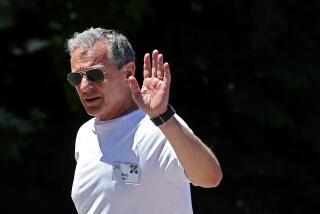AT&T; Promotes Exec Seen as Successor to Armstrong
- Share via
WASHINGTON — AT&T; Corp. on Tuesday announced the promotion of a new president to oversee its core businesses, as Chief Executive C. Michael Armstrong focuses on the details of breaking his struggling empire into three smaller pieces.
David Dorman, 46, takes over after a stint heading Concert, AT&T;’s joint venture with British Telecommunications. Many analysts read his arrival as an anointment, with Dorman now the likely successor to Armstrong, who once captured headlines as a visionary but has since become the man who presided over AT&T;’s stunning demise.
“It looks a good bit like a graceful transition,” said Scott Cleland, an analyst at the Precursor Group in Washington. “Dorman is a widely respected telecom executive.”
In an interview Tuesday, Dorman did nothing to undercut the notion that he is next in line. “People will draw conclusions,” he said. “Obviously, I’m running the largest part of the business.”
He noted that Armstrong, 62, is less than three years from AT&T;’s mandatory retirement age, with the restructuring itself expected to consume two years.
“It all depends on the job that I do and how the board views it,” Dorman said. “I’d like to make that an easy decision.”
But with AT&T; moving to split it itself into pieces in a bid to halt its plunge--its stock closed Tuesday at $18.69 on the New York Stock Exchange, down more than 60% for the year--some analysts likened Dorman’s position to being heir apparent to Mikhail Gorbachev as the Soviet Union splintered.
Under the restructuring plan, AT&T;’s cable TV and wireless businesses will be spun off into separate companies. AT&T;’s core enterprise will focus on business customers. The company will sell shares of a new stock that will track the eroding fortunes of AT&T;’s residential long-distance telephone business, the nation’s largest.
Dorman now will head the consumer and business long-distance operations and AT&T;’s global Internet network--the very operations that will eventually comprise the slimmed-down AT&T.;
AT&T;’s stock has been hurt in part by the anticipated decline of its residential long-distance revenue in the face of fierce competition. But the plunge has also been explained by unexpected troubles at AT&T;’s business services unit.
More to Read
Inside the business of entertainment
The Wide Shot brings you news, analysis and insights on everything from streaming wars to production — and what it all means for the future.
You may occasionally receive promotional content from the Los Angeles Times.










